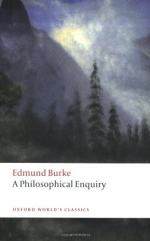
|
| Name: _________________________ | Period: ___________________ |
This quiz consists of 5 multiple choice and 5 short answer questions through Part IV, Sections I - VII.
Multiple Choice Questions
1. Into which two classes does Burke group the passions of society?
(a) General society and the society of the sexes.
(b) The societies of the educated and of the ignorant.
(c) The liberal society and the conservative society.
(d) High- and low-society, based upon the class into which one is born.
2. What passion does Burke identify as most effectively robing the mind of reasoning?
(a) Fear.
(b) Anger.
(c) Love.
(d) Disgust.
3. How does Burke define "strength?"
(a) As "earned glory."
(b) As "careful concentration."
(c) As "wild freedom."
(d) As "natural power."
4. Which passion belongs under the heading of "self-preservation?"
(a) Desire.
(b) Anger.
(c) Sadness.
(d) Pain.
5. How should the eye move, in order to qualify as beautiful, according to Burke?
(a) Slowly and languidly.
(b) Suddenly and jerkily.
(c) Rapidly and avidly.
(d) Upward and to the right.
Short Answer Questions
1. What two main passions connect with this creative power of the mind?
2. What does Burke envision would be the result of fitness trumping beauty in the human species?
3. What, according to Burke, is responsible for common deviations in natural taste?
4. What kind of colors are unfit to produce what Burke terms "grand images?"
5. What, according to Burke, is the state of a man whose teeth are set and whose forehead is wrinkled?
|
This section contains 271 words (approx. 1 page at 300 words per page) |

|




